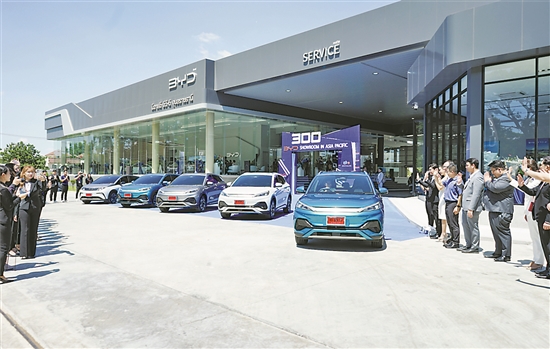
Recently, BYD celebrated the opening of its 108th store in Thailand, which also marks its 300th store in the Asia-Pacific region. This milestone not only signifies BYD's expanded footprint in the Thai market, but also highlights its growth in the Asia-Pacific market. The surge of Chinese electric vehicles in Thailand is beginning to impact Japanese automakers, with Suzuki and Subaru announcing that they would close their factories in Thailand.

Thailand is a key market in the Asia-Pacific region, and BYD's decision to establish its 300th store here underscores the company's commitment to the Thai market and its confidence in long-term development. Ke Yubin, Assistant General Manager of BYD Asia-Pacific Auto Sales Division and General Manager of BYD Thailand, stated, "By 2024, BYD plans to have more than 150 stores in Thailand, covering all 77 provinces."
BYD noted the rapid growth of the Southeast Asian automotive market, with increasing consumer demand for new technologies and a positive outlook for the development of new energy vehicles (NEVs). Over the next two years, as the supply chains in Thailand mature and the government’s supportive policies strengthen, BYD expects to increase its local manufacturing.
In 2023, Thailand saw 400,000 passenger cars sold, with electric vehicles (EVs) accounting for 18% of the total. The number of registered pure EVs in Thailand in 2023 reached 76,000, a staggering 700% increase from 9,671 in 2022. Meanwhile, the registrations of traditional fuel vehicles fell by about 13.30% compared to 2022, indicating a rapid shift towards electrification in Thailand. From January to April this year, the top seven best-selling EV models in Thailand were all from China, with the BYD Dolphin and the BYD Seal models ranking first and second, commanding over 32% market share locally.
Conversely, Japanese automakers struggling in the traditional Southeast Asian market face new challenges. Recently, Suzuki and Subaru announced that they would close their factories in Thailand. Suzuki plans to shut down its production plant in Rayong province by the end of next year, halting the production of cars and trucks in Thailand to focus on the production of EVs and hybrid vehicles elsewhere.
Reports indicate that due to the swift development of Thailand's NEV market, Suzuki's Thai factory has been operating with excess capacity and failed to meet its annual production target of 60,000 vehicles. Similarly, Subaru's dwindling sales and production inefficiencies have led to increasing losses, prompting the closure of its Thai factory.
Local automotive industry insiders attributed the rise of Chinese EVs to the local government’s supportive policies and substantial investments by Chinese automakers in Thailand. From 2024 to 2027, the Thai government will offer purchase subsidies of up to 100,000 baht per NEV. Several Chinese NEV insiders indicated that the competition in overseas markets would intensify as domestic purchase subsidies of NEVs decrease.
Source :Yangcheng Evening News
中国电动车“席卷“泰国市场,比亚迪泰国门店今年有望达150家
近日,比亚迪泰国第108家门店暨亚太地区第300家门店迎来开业,这不仅标志着比亚迪在泰国市场渠道布局的进一步完善,更是比亚迪在亚太市场发展的又一里程碑。中国电动汽车在泰国市场的崛起正在对日系汽车产生影响,日本汽车制造商铃木汽车、斯巴鲁汽车近日宣布将关闭泰国工厂。
泰国是亚太地区的重要市场之一,比亚迪将亚太第300家门店设立于此,彰显了公司对泰国市场的高度重视和长期发展的信心。比亚迪亚太汽车销售事业部总经理助理兼比亚迪泰国分公司总经理柯育滨表示:“预计2024年年内,比亚迪在泰国将布局超过150家门店,完整覆盖泰国77个府。”
比亚迪方面表示,当前,东南亚汽车市场迅速增长,消费者对新技术的需求不断提升,新能源汽车发展前景呈现向好趋势。预计未来两年,随着泰国供应链的成熟和政府政策支持的力度加大,比亚迪本地制造的比例将进一步提高。
2023年泰国的乘用车销售是40万辆,电动汽车占总销售量的18%,2023年纯电动汽车泰国注册总数为7.6万辆,与2022年9671辆增长了700%,这是个非常惊人的数字。另外,泰国传统燃油车的注册量较2022年下降了约13.30%,电动化转型正在泰国高速推进。今年1-4月,泰国电动汽车销量前7名均为中国电动车型,其中比亚迪海豚、海豹两款产品累计销量位居前两名,在当地市场占有率超32%。
相比之下,在东南亚传统市场中陷入增长困境的日系汽车,再次爆出了危机。近日,日本汽车制造商铃木汽车、斯巴鲁汽车双双宣布将关闭泰国工厂。铃木汽车宣布,将于明年年底前关闭位于泰国罗勇府的生产工厂,并停止在泰国生产轿车和卡车,后续将集中资源在其他地区生产电动车和混合动力车。
据媒体报道,随着泰国新能源汽车快速发展,铃木汽车泰国工厂燃油车产能已过剩,且始终未能达到年产6万辆汽车的目标。至于斯巴鲁汽车,在泰国的销量也是持续下降,产量不足、效率低下导致亏空扩大,斯巴鲁泰国工厂无法维持运营,因此选择关闭。
泰国当地的车企人士认为,中国电动车的崛起与当地政府对电动车的政策支持,以及中国汽车公司在当地的投资关系密切。据悉,2024-2027年,泰国政府将为购买新能源汽车的消费者提供每辆最高10万泰铢的购车补贴。多家国内新能源车企人士向记者表示,在官方新能源购车补贴减少后,中国新能源车企在海外市场的新一轮较量也要开始了。
文 | 羊城晚报记者 戚耀琪
图 | 受访者提供
译 | 邹晓华
-
Post-90s man in Zengcheng: Chef during the day and dragon head sculptor after work!
2024-06-19 23:04:55 -
Analysis: Putin's visit to DPRK raises Western concerns
2024-06-18 23:30:45 -
Santai Biotech: Moving from Kansai to Tokyo for 'openness' and "information"
2024-06-18 08:53:42 -
Shenzhen-Zhongshan Bridge: A 'rainbow across the sea' after 7 years of construction
2024-06-17 23:31:54






